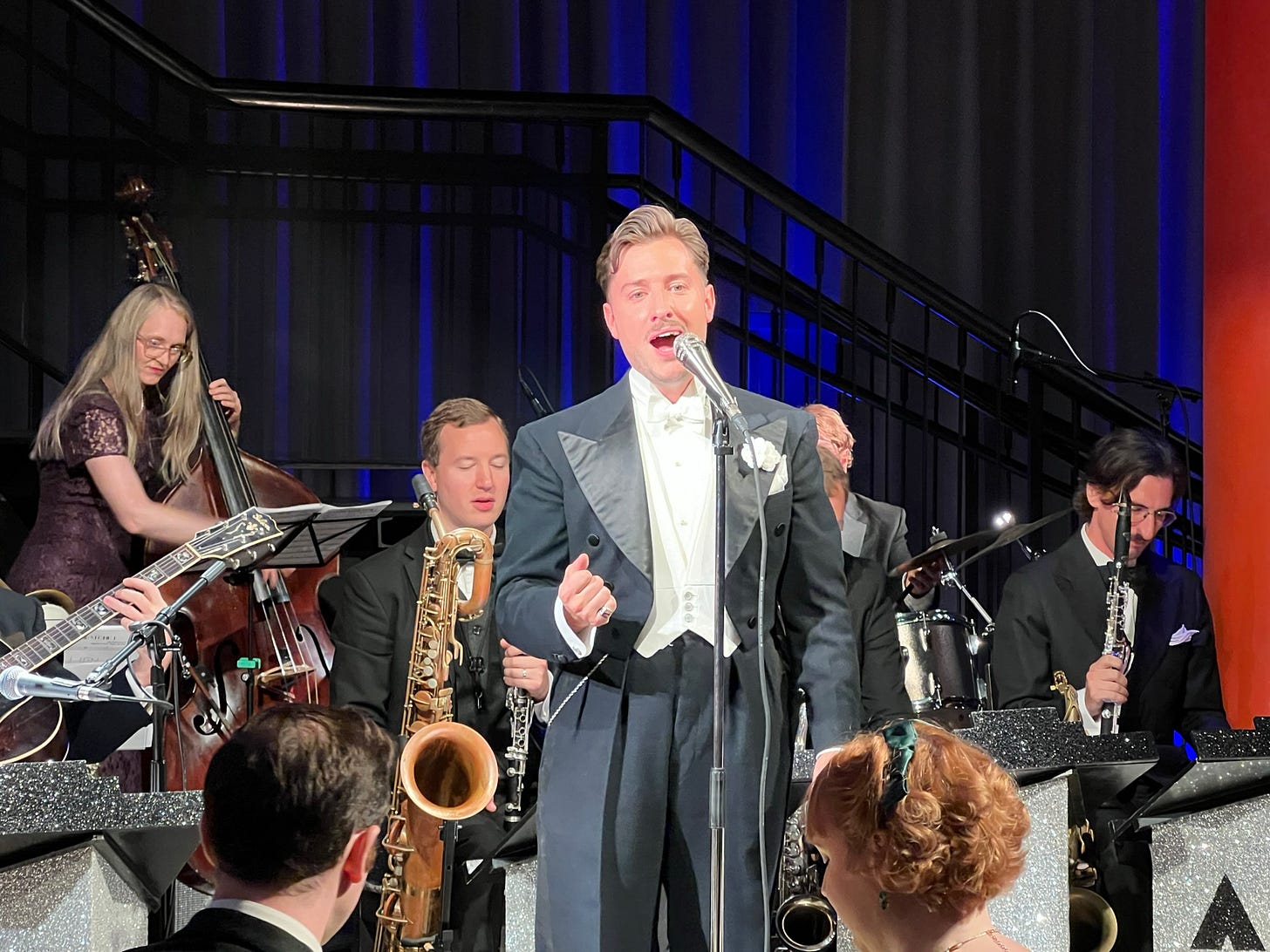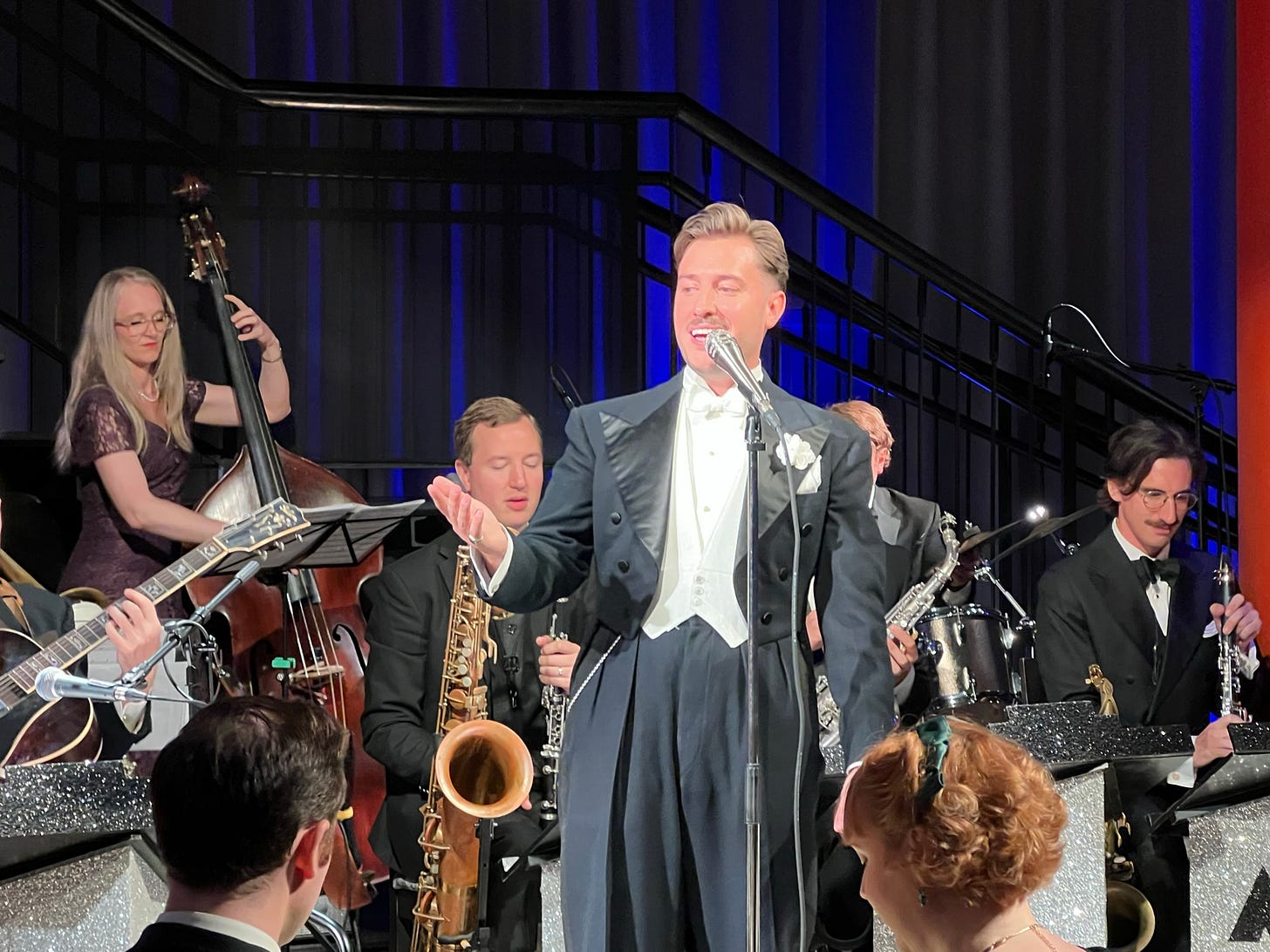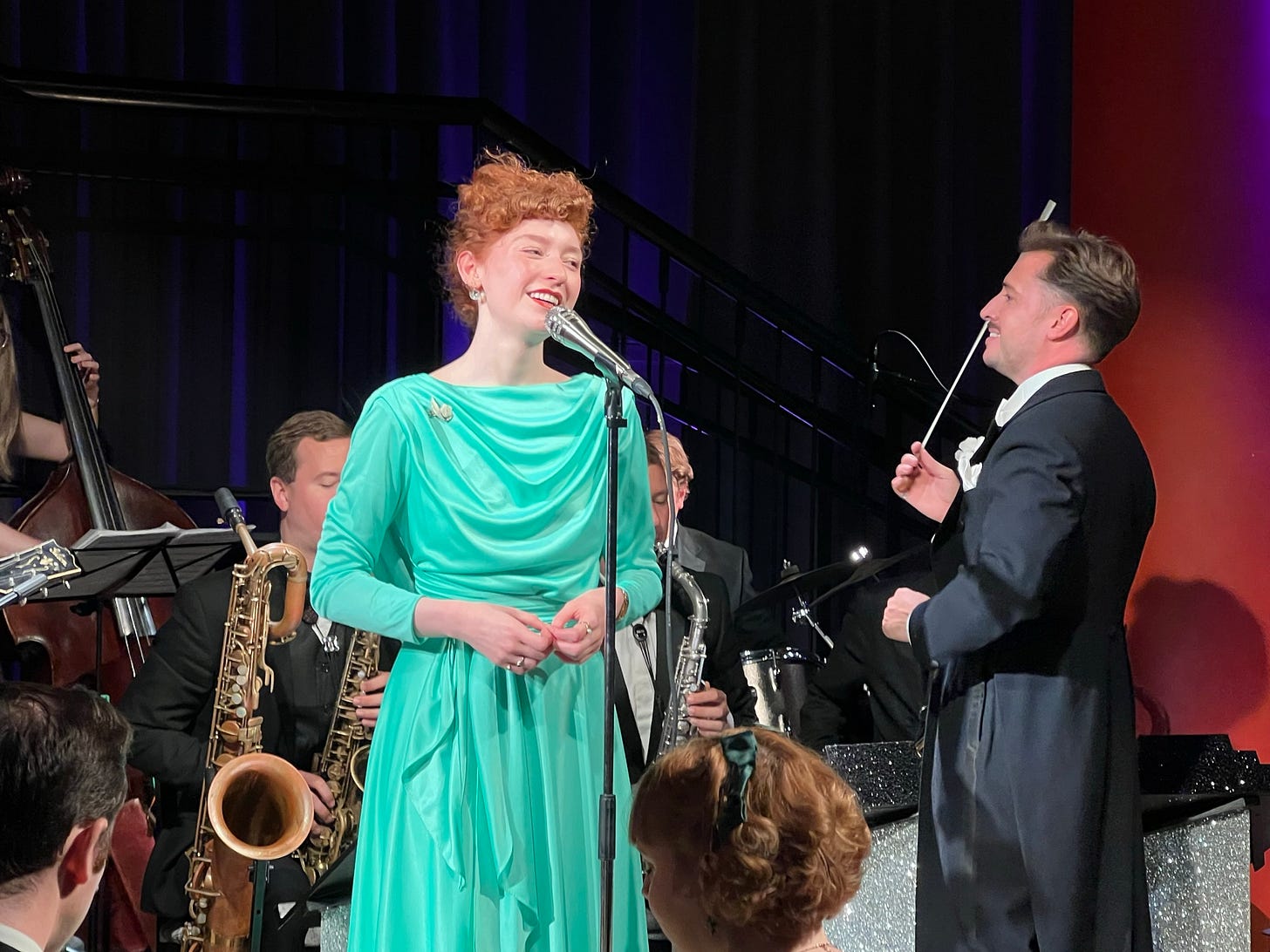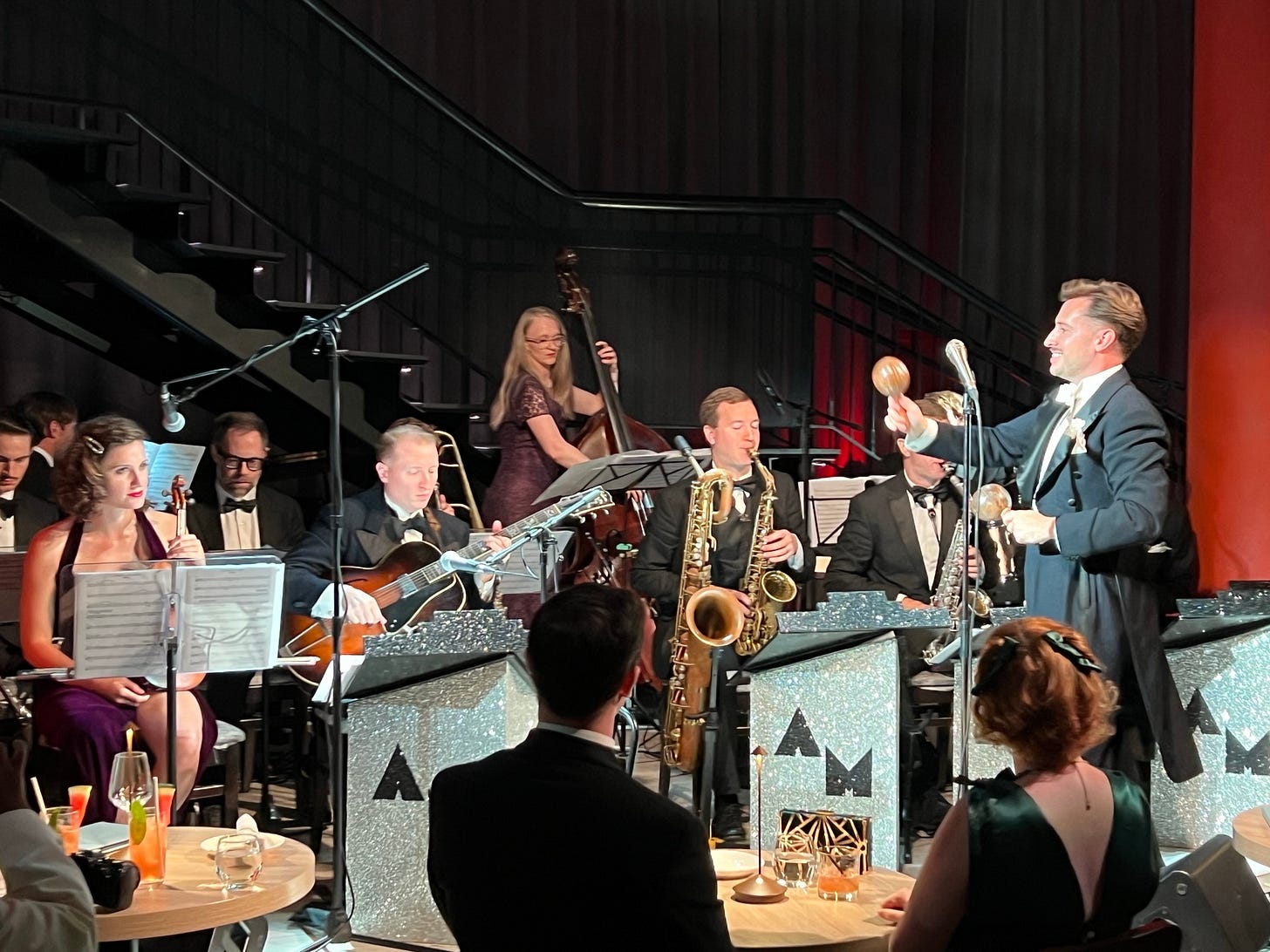I was hoping this could get into the New York Sun, but then I realized no one in the editorial office was working today. So rather than wait until tomorrow, after tonight’s gig is over, I decided to run it on SubStack today. The best thing about SubStack is that I can use four photos by Tom Buckley, I’m not limited to just one, hey.) Anyhow, I am glad to get this out before the sets at Swing 46 tonight. (Back to more Tony content tomorrow.)
Alex Mendham and his Orchestra
Chelsea Table and Stage (Saturday, July 22)
Swing 46 (Sunday, July 23)
Most musicians have a semi-permanent band that they travel with from town to town, playing for a different audience every night. Alex Mendham, a bandleader, saxophonist, and vocalist from England, seems to have reversed that equation: when he travels from London to New York, he puts together a different orchestra for each location, but he somehow brings the same audience with him.
I’m exaggerating slightly: for two post-pandemic years in a row, Mr. Mendham has performed on a transatlantic voyage on the Queen Mary followed by a night in New York (or, in this case, two). A group of his diehard fans cruised with him, and thus first heard him in London, then on multiple nights mid-ocean, and then again stateside. They were there on Saturday night at Chelsea Table and Stage, and doubtless will be present again tonight, when he performs at Swing 46.
It wasn’t hard to spot Mr. Mendham’s regulars: they were impeccably dressed in gowns and tailcoats, or, at the very least, spiffy cutaway tuxedos. The rest of us locals showed up in baggy Hawaiian shirts - what else would a New Yorker wear in July? - and shorts, an appropriate response to a humidity wave in which the subways are transformed into the world’s dirtiest sauna.
In an all-too brief set on Saturday night, Mr. Mendham played two Duke Ellington classics, “Cotton Club Stomp” and “The Mooch,” as well as one of the least typical, most offbeat numbers ever recorded by Fletcher Henderson. He started with “Cotton Club Stomp,” a title that the composer used for more than one composition - this seemed to be the tune what Ellingtonians would call “Cotton Club Stomp #1.” I didn’t recognize it at first, since I’m accustomed to hearing it played at a tempo at least twice as fast. This slower interpretation caught me by surprise, and showed how much leeway there is even in performing very specific, 100-year-old charts.
Mr. Mendham’s orchestra is a very straight ahead, modern reassemblage of a hot dance dance circa 1930, years before the swing era, but incorporating a lot of excellent jazz in its purview. Both times I’ve heard him, he’s used primarily local New York players, among them the excellent trumpeter Mike Davis, guitarist Glenn Crytzer, and a reed section of Will and Peter Anderson and Ricky Alexander, outstanding soloists all. He also features an excellent vocalist in Allison Young, a Nashville-based singer most of us know from youtubes with Postmodern Jukebox.
Proudly waving the Union Jack - God Save the King - Mr. Mendham specializes in the snappy-peppy art deco dance music of his native land. Many of us Yanks first discovered what we now call “The Great British Dance Bands” in the aftermath of the 1978 BBC TV drama Pennies from Heaven, writer Dennis Potter’s multi-layered masterpiece. Between the series itself and the ancillary LPs released in conjunction therewith, we first encountered the likes of Lew Stone, Jack Hylton, Ambrose, Ray Noble’s New Mayfair Orchestra, and the truly legendary Al Bowlly, who took his place alongside Bing Crosby as one of the major voices of the interwar era.
Mr. Mendham gave us Stone’s bubbly “Pop Goes Your Heart” and, on the hotter side, Noble’s surprisingly hard-driving “You Ought To Be in Pictures.” This is the rare dance arrangement of the period that leans hard on baritone saxophone - the London reed virtuoso Freddy Gardner on the original, Pete Anderson with Mr. Mendham. “Better Think Twice” recreated the 1934 recording by the Savoy Hotel Orpheans, including a strident, ragtime-y piano solo by leader Carroll Gibbons, here played by Bryan Reeder.
The Saturday set was filled with vintage arrangements, mostly transcribed from historical recordings, that I’d never heard played live before. There was Ms. Young singing Mildred Bailey’s original version of “Georgia on My Mind,” complete with the verse, almost 30 years before Ray Charles. “Cabin in the Pines,” a 1933 song by Billy Hill, who overlapped between Tin Pan Alley and Nashville, also gave us more Southern pine trees, and “Stars Fell on Alabama” brought us back to the same idealized vision of the land below the Mason Dixon. (A more contemporary version might be called “Stars Redistricted Alabama.”)
Apart from British bands, there was a lot of Crosbyana: not only “Cabin in the Pines” which was Bing’s sort of sequel to “Cabin in the Cotton,” as well as one of his lustiest early vocals, “One More Time,” a hot number that featured bassist Jen Hodge, All of these, including Johnny Green’s classic “Out of Nowhere,” which achieved a sort of latter day immortality as the harmonic foundation for Alexander Courage’s original theme to “Star Trek,” roughly split the difference between what was then called a “personality” record and a more customary dance-driven arrangement. The closer, “Goodnight Sweetheart,” was a British song but used Crosby’s arrangement, with the verse in the middle and a parlando second chorus, as a template.
There were more surprises, among them a rhumba by Eddy Duchin, thought of as a sweet bandleader but whose version of the 1934 “Dust on the Moon” had plenty of oomph. Mr. Mendham’s singing, it must be said, was a noticeable improvement on Duchin’s band singer Lew Sherwood, who had a hard time navigating through what was then a very exotic and unusual Cuban clave beat.
By the way, that unusual Fletcher Henderson number was “Take a Picture of the Moon,” from a 1932 Victor session in which the Hendersonians were called upon to accompany Baby Rose Marie, a growling, mature-sounding eight-year-old child wonder. (And yes, a Rose Marie Centennial CD is coming this summer, which I’ll write about either here or for The New York Sun.) Oddball as it may be in the Fletcher oeuvre, it’s always been a Friedwald favorite, especially as sung by either Tatiana Eva-Marie (on her current album, I Double Dare You) or by Ms. Young here.
Chelsea Table and Stage has excellent audio, although the sight lines aren’t ideal for a larger ensemble - from where I was sitting, Mike Davis was the trumpet man who wasn’t there, heard but not seen. (For a minute, I thought it was the invisible ghost of Bix on “From Monday On.”) Swing 46 should be an improvement in that regard, plus there’s actually space for dancing - at Chelsea Table Mr. Mendham’s loyal following of well dressed ballroom dancers were forced to execute pirouettes and pases-de-deux in between tables when the waiters weren’t looking.
Hopefully, Alex Mendham and his Transatlantic Orchestra will make it to midtown again soon; with any luck, somebody will remind me to dress for the occasion.
SLOUCHING TOWARDS BIRDLAND is a subStack newsletter by Will Friedwald. The best way to support my work is with a paid subscription, for which I am asking either $5 a month or $50 per year. Thank you for considering. Word up, peace out, go Forth and Sin no more!








Your quip about “Stars Fell Upon Alabama” prompted a chuckle. Your humor is always refreshing!
Ooh, thanks for this! I will keep on the lookout for Mendham.